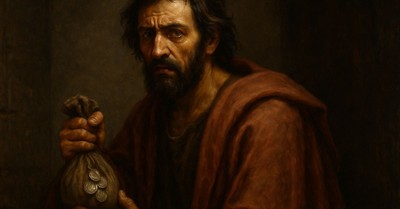Choosing Judas
Dr. James Emery White


Audio By Carbonatix
By Dr. James Emery White, Crosswalk.com
I once did a message series titled “Everything You Always Wanted to Know About Jesus... but Were Afraid to Ask.” Leading up to the series, we asked people to submit their questions about Jesus, particularly the ones they weren’t quite sure were legal to verbalize. We ended up grouping them in three categories: questions about Jesus’ personal life, His actions, and salvation.
So, what did people want to know? About His personal life, they were curious as to what He looked like, what His childhood was like, did He have any siblings, when did He know He was God, and if He was ever married. As for His actions, they wanted to know why He prayed to God if He was God, why He met with the devil, why He overturned the tables in the Temple, and why He said from the cross, “My God, my God, why have you forsaken me?” As to matters related to salvation, they wanted to know about people before Jesus, those who never heard about Him, those who turned away from the faith, whether Jesus was a Calvinist, and about deathbed conversions. All in all, it provided the grist for a pretty robust series. You can get a hold of that series HERE.
But one question stood out to me—not only for the frequency with which it was asked, but also for how seldom I had heard it addressed:
Why did Jesus choose Judas, knowing He would betray Him?
And they were right—Jesus did choose Judas and did know he would betray Him. As we read in John’s biography of Jesus:
“‘But some of you do not believe me. (For Jesus knew from the beginning which ones didn’t believe, and he knew who would betray him.) ... I chose the twelve of you, but one is a devil.’ He was speaking of Judas, son of Simon Iscariot, one of the Twelve, who would later betray him.” (John 6:64, 70-71, NLT)
Judas later became the treasurer of the group, and he used the role to both steal money and feed his greed. In fact, it was greed that prompted him to betray Jesus to the chief priests, for he bargained a payment of 30 pieces of silver. He then plotted and waited for the opportunity, and during that last, fateful Passover meal, he left the room and carried out his plan. He led the soldiers to the Garden of Gethsemane and betrayed Jesus with a kiss.
It didn’t end well. When Jesus was condemned to death, Judas was overwhelmed with remorse. He went to the chief priests and threw the money on the ground at their feet. And then he went out and hanged himself. Later we read that apparently, he hung there so long, without anyone cutting him down, that when he did eventually fall down, he was so decomposed that his stomach burst open.
So why did Jesus pick him? Why did He call Judas to do life with Him, to learn from Him, to be challenged by Him, to give his life to Him, when He knew he wouldn’t offer anything in return but betrayal? We don’t know for sure, but there are at least two reasons worth thinking about:
The first reason is that Jesus knew how His life was meant to end. Jesus knew He was born to die. That part of the plan would involve a man like Judas who would betray Him. So when He prayerfully picked His inner circle, and knew He was to pick Judas – and knew, even then, that Judas would betray Him – it shows how clear the road to the cross was for Jesus. Jesus picked him out of obedience to His mission.
But that’s not all.
He also called him for the same reason He calls everyone else in this world. The same reason He calls you. You can say, “No,” you can reject Him, but it doesn’t mean He’s not going to call you. So even though we can turn on Jesus, betray Jesus, choose to reject Jesus, it doesn’t mean He still doesn’t beckon to us all in the hopes that we won’t turn, won’t betray, won’t reject.
You see, while Jesus knew what Judas was going to do, Judas still did it of his own free will. Knowing someone is going to do something, or is likely to do something, isn’t the same as making them do it. So you can imagine how heartbreaking it must have been for Jesus to pour into Judas, teach Judas, do life with Judas, knowing that in the end, Judas would betray Him.
Why?
Jesus loved him as much as any of the others. Hoped for him as much as for the others. Judas just broke His heart more than any of the others. In fact, Jesus kept giving him chances to change course, all the way to the bitter end:
“Now Jesus was deeply troubled, and he exclaimed, ‘I tell you the truth, one of you will betray me!’
The disciples looked at each other, wondering whom he could mean. The disciple Jesus loved was sitting next to Jesus at the table.
Simon Peter motioned to him to ask, ‘Who’s he talking about?’ So that disciple leaned over to Jesus and asked, ‘Lord, who is it?’
Jesus responded, ‘It is the one to whom I give the bread I dip in the bowl.’ And when he had dipped it, he gave it to Judas, son of Simon Iscariot. When Judas had eaten the bread, Satan entered into him. Then Jesus told him, ‘Hurry and do what you’re going to do.’ None of the others at the table knew what Jesus meant. Since Judas was their treasurer, some thought Jesus was telling him to go and pay for the food or to give some money to the poor. So Judas left at once, going out into the night.” (John 13:21-30, NLT)
Jesus knew Judas planned to betray Him. Judas knew he planned to betray Him. But Jesus had him sit next to Him, in the place of honor, on that fateful night. And lest we forget, earlier, Jesus had even washed his feet along with the other disciples. Then He honored Judas even more by personally feeding him bread to eat. In that day, in first-century Palestine, if you sat someone by your side, and then handed them their food to eat, you were giving them the highest honor, showing them the depth of your friendship, telling them how much they meant to you. It was as if Jesus was making His final appeal to Judas: “Don’t do this! Don’t become this! Don’t let it end this way!” Every opportunity was given for Judas to turn from his plan.
Judas did not accept the final plea.
He gave himself over to the evil one and went out into the night to carry out his plan. You can only imagine that when Jesus said, “Hurry and do what you are purposing to do,” it was with tears in His eyes.
As it is with everyone who rejects Him.
And that is why Jesus chose Judas.
James Emery White
Photo credit: ChatGPT/DALL.E
James Emery White is the founding and senior pastor of Mecklenburg Community Church in Charlotte, NC, and a former professor of theology and culture at Gordon-Conwell Theological Seminary, where he also served as their fourth president. His latest book, Hybrid Church: Rethinking the Church for a Post-Christian Digital Age, is now available on Amazon or from your favorite bookseller. To enjoy a free subscription to the Church & Culture blog, visit churchandculture.org where you can view past blogs in our archive, read the latest church and culture news from around the world, and listen to the Church & Culture Podcast. Follow Dr. White on X, Facebook, and Instagram at @JamesEmeryWhite.






